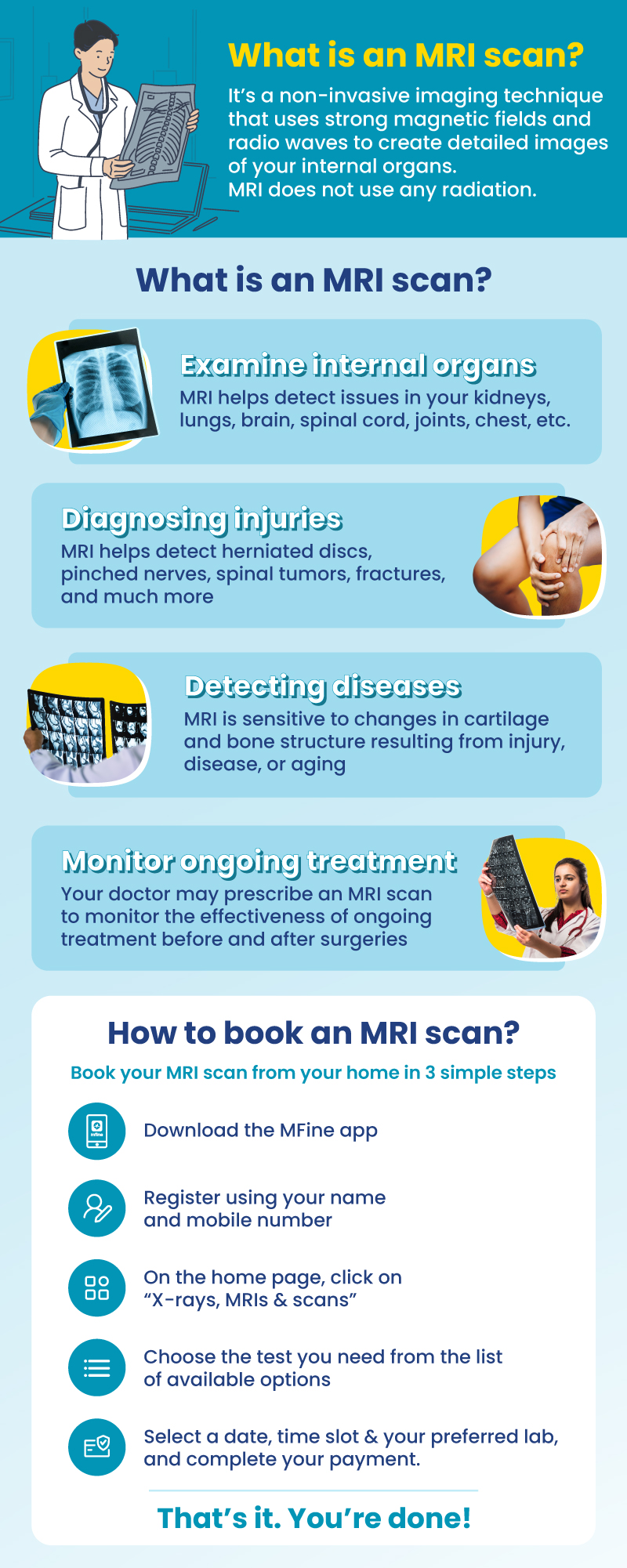
Save big on Brain MRI scans with MFine! Enjoy a massive discount of up to 50% off in Pune and access top-tier lab facilities for a seamless scanning experience.
MRI Scan in Pune by MFine
|
Typically, the market rate for a Brain MRI scan in Pune exceeds ₹6,500. Nevertheless, if you choose to book with MFine, you can avail the same service for just ₹3,500.
Act now and call us at
Or click the button below to avail this unbeatable deal. Your health matters, and we’re here to help!
As a token of appreciation, we’re providing a complimentary online consultation with a doctor when you book your MRI scan through us. Get the best of both worlds—affordable scans and expert medical advice.
Brain MRI scan costs in Pune
Check out the discounted rates for the frequently conducted Brain MRI scans in Bangalore, listed below. For the most current information on prices, don’t hesitate to get in touch with us.
| Different kinds of MRI Brain Scans | Starting Price |
| MRI Brain Scan Price in Pune | ₹3500 |
| MRI Brain Contrast Price in Pune | ₹6000 |
| MRI Brain Screening Price in Pune | ₹2000 |
Tailor your MRI Brain Scan experience with our wide array of protocols. Get in touch with us at 08061970525 to delve into the options and secure a booking at a lab that fits your schedule seamlessly.
Why should I book an MRI through MFine?
|
Exclusive Benefits with MFine
(1) Certified labs
Get access to over 600+ labs certified by NABL and NABH
(2) Same-day slot available
Get scans done on the same day
(3) Quick and convenient
Get reports in 12 hours and digital films in 15 – 20 minutes
(4) FREE Consultation
Post scans, consult a doctor for free to review your report
What is a Brain MRI Scan?
To assess your brain, a Brain MRI Scan stands out as the most sensitive and safe imaging method. Utilizing powerful electromagnetic and radio waves, this painless procedure offers detailed images of various head components, including:
- Brain
- Skull
- Facial bones
- Nerves
- Inner structures of your ears
- Eyes
- Other soft tissues like fat, bones, and connective tissues in your head.
Notably, MRIs do not involve ionizing radiation, prioritizing patient well-being.

What is a brain MRI with contrast?
Enhancing the brain MRI with a contrast agent involves intravenous administration to optimize image quality and precision. This enhancement aids in the clearer visualization of vital brain structures, including
- Blood vessels
- Tumors
- Inflammation
- Blood supply
- Fluid leaks
- Hemorrhage
- White matter disease, and others.
This imaging technique plays a crucial role in diagnosing strokes, multiple sclerosis, dementia, brain infections, and various neurological disorders.
While contrast materials are considered safe, severe reactions are exceptionally uncommon.
Why would a doctor prescribe an MRI of the brain?
An MRI of the brain is requested by doctors to identify and diagnose various neurological conditions, which may include:
- Strokes
- Dementia
- Encephalitis (brain infection)
- Brain aneurysm (a bulge in the blood vessel)
- Brain hemorrhage (bleeding in the brain tissue)
- Brain damage due to Epilepsy
- Multiple sclerosis (damage to nerve fibers)
- Pituitary gland diseases
- Traumatic brain injuries
- Migraines
- Seizures
- Hearing loss
- Hormonal imbalances related to the hypothalamus
- Extreme fatigue and weakness
- Significant changes in your thinking and behavior, etc.
What are the prerequisites for a Brain MRI scan?
To prepare for a Brain MRI scan, several prerequisites must be met:
- Medical History: It is essential to provide a detailed medical history, particularly related to any conditions related to the brain. This information is crucial in ensuring that the diagnosis is accurate and appropriate treatment is provided. Therefore, it is essential to be honest and thorough when discussing your medical history with your healthcare provider.
- Allergies: When you go for a medical scan, it is crucial that you inform your healthcare provider of any allergies you may have. This is especially important if you have an allergy to contrast agents, which may be used during the scan. By letting your healthcare provider know of your allergies beforehand, they can take the necessary precautions to ensure your safety and well-being during the procedure. So, be sure to speak up and inform your healthcare provider of any allergies you have before undergoing a scan.
- Pregnancy: If you suspect that you might be pregnant, it is crucial to let your healthcare provider know. It is especially important to do so if you are scheduled for an MRI scan. This is because MRI scans are typically not recommended during the first trimester of pregnancy. Your healthcare provider can provide you with guidance on the best course of action and ensure that you and your baby remain safe and healthy.
- Metal Implants or Devices: It is important to let the medical staff know if you have any metal implants or devices in your body before undergoing an MRI. This information is crucial as metal objects can interfere with the accuracy of the MRI results. It is always better to be safe than sorry, so please do not hesitate to inform the medical personnel before the procedure.
- Claustrophobia: If you have a fear of enclosed spaces, also known as claustrophobia, it is crucial to let the medical staff know before undergoing a scan. This will allow them to take the necessary measures to make sure you are comfortable during the procedure. Some options may include medicated sedation or open MRI machines. Don’t be afraid to speak up and advocate for your needs. Your safety and well-being are the top priority.
FAQs
How much does an MRI scan cost in Pune?
The usual market price for an MRI in Pune costs above ₹6,500. But with us, you can get it for just ₹3,500. Call us now
Which is more costly, MRI or CT scan?
In general, MRI scans are more costly than CT scans. The higher cost of MRI is due to several factors, including the sophisticated technology used in MRI machines, the longer duration of the procedure, and the higher resolution and quality of the images obtained. CT scans, on the other hand, use X-rays and are generally quicker, making them a more cost-effective option in certain situations. The choice between MRI and CT scan depends on the specific medical condition being investigated and the information required for accurate diagnosis.
What are the risks of having an MRI scan?
Undergoing an MRI is generally safe and does not involve any invasive procedures. However, some people may feel uneasy or anxious when in the MRI machine due to claustrophobia. Although it is uncommon, there is a possibility of an allergic reaction to the contrast agents utilized in some MRI scans. In addition, gadolinium-based contrast agents might be risky for patients with severe kidney problems, as it could cause a rare condition known as nephrogenic systemic fibrosis (NSF). Before undergoing an MRI, patients must inform their healthcare team of any known allergies or kidney issues to ensure their safety.
Does myasthenia gravis show on brain MRI?
Myasthenia gravis primarily affects the neuromuscular junction, the connection between nerves and muscles, and is typically not visible on a brain MRI. The diagnosis of myasthenia gravis is made through a combination of clinical evaluation, specific neurological tests, and, in some cases, antibody testing. While a brain MRI may not directly show myasthenia gravis, it can be useful in ruling out other brain-related conditions that may cause similar symptoms.
What is the safest contrast for MRI?
Gadolinium-based contrast agents are commonly used in MRI to enhance image quality and provide additional information about certain tissues or structures. While these agents are generally considered safe for most people, a small percentage of patients with severe kidney dysfunction may be at risk of developing nephrogenic systemic fibrosis (NSF) after receiving gadolinium-based contrast. For these individuals, alternative imaging methods or contrast agents may be considered. It’s important for patients to inform their healthcare providers about any kidney problems before undergoing an MRI with contrast.
When is an MRI contraindicated?
An MRI may be contraindicated in certain situations where it may pose risks or interfere with medical devices or conditions. Contraindications for MRI include:
- Pacemakers or certain types of metallic implants that are not MRI-safe.
- Implanted devices, such as some neurostimulators or cochlear implants, that may be affected by the MRI’s magnetic fields.
- Metallic foreign bodies in the eye that can be dislodged or cause injury during the MRI.
- Pregnancy during the first trimester, as a precautionary measure due to the use of strong magnetic fields.
It is crucial for patients to provide a thorough medical history and inform the healthcare team of any implanted devices or metallic objects in their bodies before scheduling an MRI.
Can I refuse contrast with my MRI?
Yes, patients have the right to refuse the use of contrast agents during an MRI. The decision to use contrast is typically based on the specific medical indications and the healthcare provider’s judgment. If a patient has concerns or known allergies to contrast agents, they should discuss their preferences and any potential risks with the healthcare team before the MRI procedure. It is important for patients to be actively involved in their healthcare decisions and to communicate their preferences to their medical providers.
Other topics you may be interested in
| For further assistance call us on ☏08061970525 |

 Call us:
Call us:


 Call
Now
Call
Now